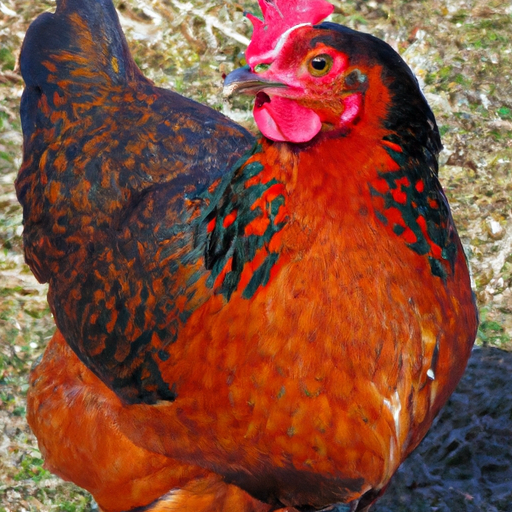Are you considering getting chickens but worried about the time and effort it takes to care for them? Look no further! In this article, we will explore various low-maintenance chicken breeds that are perfect for beginners or those with a busy schedule. Whether you’re a first-time chicken owner or simply looking to add more chickens to your existing flock, we’ve got you covered with some fantastic recommendations. So sit back, relax, and let’s find out which low-maintenance chicken breeds are right for you!
Choosing Low-Maintenance Chicken Breeds
When it comes to raising chickens, choosing the right breed is crucial. If you’re looking for low-maintenance chicken breeds, there are some key characteristics you should consider. From hardiness and adaptability to egg-laying capacity and temperament, these factors can determine how easy it will be to care for your feathered friends. By understanding the breed characteristics, you’ll be able to make an informed decision and choose the best low-maintenance chicken breeds for your flock.
Breed Characteristics to Consider
Before diving into specific breeds, it’s important to understand the key characteristics that make a chicken breed low-maintenance. These characteristics include hardiness, adaptability, foraging abilities, egg-laying capacity, and temperament.
Hardiness and Adaptability
Low-maintenance chicken breeds are typically hardy and adaptable to different climates and environments. They are able to withstand extremes in temperature, making them suitable for various regions. These breeds also tend to be disease-resistant and have a lower risk of health issues, making them easier to care for.
Foraging Abilities
Foraging is a natural behavior for chickens, and breeds with good foraging abilities can greatly reduce the amount of feed you’ll need to provide. Chickens that are skilled at finding their own food, like insects and plants, will be less dependent on you for sustenance. This can be especially beneficial if you have a large flock or if you’re looking to minimize your expenses.
Egg-Laying Capacity
If you’re interested in having a constant supply of fresh eggs without much effort, choosing a breed with a high egg-laying capacity is essential. Low-maintenance chicken breeds are known for their consistent egg production, often laying large and delicious eggs. By selecting a breed with a good egg-laying capacity, you can enjoy a bountiful supply of eggs without the need for extra maintenance or specialized care.
Temperament and Docility
Dealing with aggressive or flighty chickens can be a challenge, especially if you have children or other pets. Opting for a low-maintenance chicken breed with a friendly temperament and docile nature can make your chicken-keeping experience a lot more enjoyable. These breeds are known for being calm and easy to handle, which can save you time and effort when it comes to managing your flock.
Top Low-Maintenance Chicken Breeds
Now that we’ve explored the key characteristics to consider, let’s dive into the top low-maintenance chicken breeds. These breeds have been selected based on their reputation for being low-maintenance and their overall suitability for backyard flocks.
1. Rhode Island Red
The Rhode Island Red is a classic backyard breed known for its hardiness and adaptability. These chickens are highly productive, laying approximately 200 to 300 brown eggs per year. Rhode Island Reds are also known for their calm and friendly demeanor, making them great for families with children.
2. Sussex
The Sussex breed is renowned for its versatility and resilience. Available in both light and heavy varieties, Sussex chickens are well-suited for different climates and environments. They are excellent foragers and can thrive on a varied diet, which makes them low-maintenance in terms of feeding. Sussex chickens also lay a good number of large brown eggs, adding to their appeal.
3. Plymouth Rock
Plymouth Rock chickens are often recommended for those looking for low-maintenance breeds. They are sturdy, adaptable, and capable of handling different climates. These chickens have a calm temperament and are easy to handle, making them great pets for families. With their brown eggs, Plymouth Rock chickens are reliable layers, providing you with a steady supply of delicious eggs.
4. Australorp
If you’re looking for a low-maintenance breed that excels in egg production, the Australorp is a fantastic choice. These chickens hold world records for laying the most eggs in a year, with some Australorps producing over 300 eggs annually. Despite their high productivity, Australorps are known for their calm and docile nature, making them ideal for novice chicken keepers.
5. Orpington
Orpington chickens are known for their friendly and laid-back temperament, making them great additions to any backyard flock. These birds are low-maintenance in terms of handling and are excellent for families with children. Orpingtons also have a good laying capacity, producing around 200 brown eggs per year. With their soft and fluffy feathers, they are not only practical but also visually appealing.
6. Wyandotte
When it comes to low-maintenance chicken breeds, Wyandottes are often recommended for their hardiness and adaptability. These chickens can withstand both cold and hot climates, making them suitable for various regions. Wyandottes are also excellent foragers and can find a substantial portion of their own food, reducing your reliance on store-bought feed. With their beautiful laced feathers and good egg-laying capacity, Wyandottes are a popular choice among chicken enthusiasts.
7. Barred Rock
Barred Rock chickens are known for their black and white striped plumage, which gives them a distinctive appearance. These chickens are highly adaptable and thrive in a variety of environments. They are excellent foragers and have a good egg-laying capacity, making them low-maintenance when it comes to both feeding and egg production. Their friendly disposition also makes them a popular choice among chicken keepers.
8. Easter Egger
If you’re looking to add some color to your flock, Easter Eggers are an excellent choice. These chickens are known for their ability to lay eggs in various shades of blue, green, and even pink. Easter Eggers are a mix of different breeds, which gives them a unique and diverse appearance. They are generally hardy and low-maintenance, making them suitable for beginners and experienced chicken keepers alike.
9. Speckled Sussex
Speckled Sussex chickens are not only beautiful but also low-maintenance. They have a calm and friendly temperament, making them great pets. These chickens are also capable of finding a significant portion of their own food, thanks to their excellent foraging abilities. With their good egg-laying capacity, Speckled Sussex chickens are a popular choice for backyard flocks.
10. Delawares
Delawares are known for their hardiness and cold tolerance, making them suitable for various climates. These chickens have a moderate egg-laying capacity, producing approximately 200 to 250 brown eggs per year. Delawares are also relatively low-maintenance, requiring less specialized care compared to some other breeds.
Feeding and Housing Low-Maintenance Chickens
Now that you have a better idea of the low-maintenance chicken breeds available, let’s delve into their feeding and housing needs.
Feeding Requirements
Low-maintenance chicken breeds thrive on a balanced diet consisting of quality chicken feed, supplemented with kitchen scraps and foraged treats. Investing in a good-quality feed that meets their nutritional needs is essential for their health and productivity. Providing your chickens with access to fresh water at all times is also necessary.
Additionally, allowing your low-maintenance chickens to free-range or providing them with a spacious chicken run can help satiate their natural instinct to forage. This not only reduces the amount of feed you need to provide but also keeps the chickens mentally stimulated and physically active.
Housing Needs
When it comes to housing low-maintenance chickens, simplicity is key. Providing them with a sturdy and secure coop that offers protection from predators and the elements is crucial. The coop should be well-ventilated to keep the chickens comfortable and promote good air circulation. Additionally, it should be sufficiently spacious to allow for easy movement and nesting.
Aim to provide at least 4 square feet per chicken inside the coop and a minimum of 8 to 10 square feet per chicken in the outdoor run. This will ensure that your low-maintenance chickens have plenty of space to move around and engage in natural behaviors.
Predator Protection
Protecting your low-maintenance chickens from predators is essential to ensure their safety and well-being. Take measures to secure their coop and run by using sturdy fencing with small openings that can prevent access from animals like raccoons and foxes. Consider burying the fencing at least 12 inches below ground to prevent digging predators from gaining access.
Additionally, install a predator-proof latch on the coop door and reinforce windows and vents with heavy-duty wire mesh. Regularly inspect the coop for any potential entry points or weak spots that predators could exploit.
Health and Care of Low-Maintenance Chicken Breeds
While low-maintenance chicken breeds are generally hardy and less susceptible to health issues, proper care is still necessary to keep them in optimal condition.
Common Health Issues
Low-maintenance chicken breeds can still experience common health issues such as parasites, respiratory infections, and diseases. It’s essential to monitor your flock regularly for any signs of illness or distress. Look out for symptoms like decreased appetite, lethargy, abnormal droppings, or respiratory issues. If you notice any of these signs, consult a poultry veterinarian for proper diagnosis and treatment.
Preventative Measures
To minimize the risk of health issues, practice good biosecurity measures. Keep the coop clean and dry, regularly remove droppings, and provide clean bedding. Quarantine new birds before integrating them into your existing flock to prevent the spread of diseases. Provide a balanced diet and ensure your chickens have access to clean water and appropriate nutrition to support their immune system.
Regular Maintenance and Care
Routine maintenance and care are crucial for keeping your low-maintenance chickens healthy and content. This includes regular cleaning of the coop, checking nesting boxes for cleanliness, and ensuring the chickens have access to fresh food and water. Monitoring their behavior, appearance, and egg production on a daily basis can help you identify any potential issues early on.
Additionally, providing your chickens with opportunities for exercise, socialization, and mental stimulation can enhance their overall well-being. Simple activities like scattering scratch grains for them to search or providing pecking toys can keep your low-maintenance chickens entertained and happy.
In conclusion, choosing low-maintenance chicken breeds can greatly simplify your chicken-keeping experience. By considering breed characteristics such as hardiness, adaptability, foraging abilities, egg-laying capacity, and temperament, you can select the perfect flock for your needs. Remember to provide appropriate feeding, housing, and predator protection, as well as regular health care and maintenance. With the right choices and care, you can enjoy the pleasure of raising chickens without excessive time and effort.




